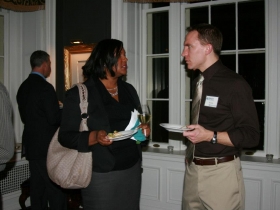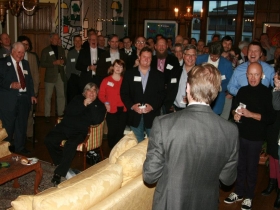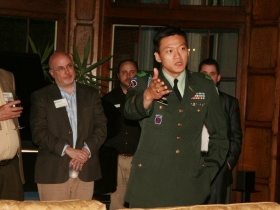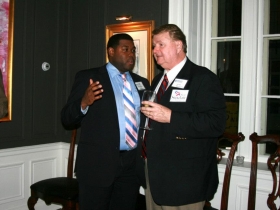Abele and Other Pols Push Gay Rights
Gay activist Daniel Choi comes to Milwaukee three days before his trial for protesting "Don't Ask, Don't Tell."
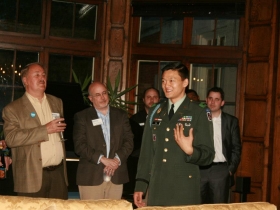
Lt. Dan Choi. Photo by Emily Bunzel courtesy of Equality Wisconsin.
If his situation were not so dire, West Point grad Daniel Choi could turn his coming-out story into a comedy act. He is a motivational speaker with the best of them, his voice as commanding as a drill sergeant’s; his speech as persuasive as a sermon.
On Thursday, March 28th 2013, though, he will be telling it to the Judge in federal court in Washington D.C. Choi and twelve others were charged in November 2010 with failing to obey a lawful order made by a police officer, specifically to move from their location in front of the White House where they were protesting the government’s “Don’t Ask, Don’t Tell” policy. Choi and the others had handcuffed themselves to the fence as part of their protest, and it took bolt cutters to remove them and haul them off in a paddy wagon.
You’d think this sort of non-violent protest would involve a municipal citation, or possibly even deferred prosecution, but the US Attorney, tipped off in advance of the protest, had already determined a course of criminal prosecution for Choi and the others. He faces up to six months in jail for his non-violent protest.
Choi is the last remaining defendant in the case; the others, including Milwaukeean Army Sgt. Miriam Ben-Shalom, who was discharged for homosexuality in 1976, made plea deals.
But Choi, with military resolve, continues to fight the government charges, and expects to be exonerated.
Choi gave his account as a special guest at a joint fundraiser for Fair Wisconsin and Equality Wisconsin, held Tuesday, March 25th at the N. Terrace Ave. home of noted art collector Andy Nunemaker, who was joined by co-host County Executive Chris Abele. Both provided a $5,000 matching grant for funds raised that evening from about 90 attendees, including Milwaukee Ald. Tony Zielinski, County Board Chair Marina Dimitrijevic, Assembly Representative JoCasta Zamarripa, Sen. Chris Larson and out congressman Mark Pocan, along with Gary Goyke, the former state Senator who sponsored Wisconsin’s groundbreaking gay rights act.
Abele introduced the evening with an anecdote about an event he attended some years ago where philanthropists got together and talked about their concerns. Among those in the group, he said, was Mike Grebe of the conservative Bradley Foundation.
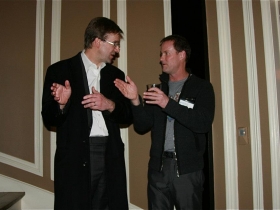
Chris Abele and Andy Nunemaker. Photo by Emily Bunzel courtesy of Equality Wisconsin.
Abele said he brought up the topic of gay marriage, asking the conservative crowd, “what would your kids think of you 30 years from now,” if the children were to find out the parents opposed gay marriage.
“I got hate mail,” he said, for suggesting that gay marriage should be and would be accepted.
“The mood in this country has changed so much” on the subject today, he said, with 58 percent of adults in favor and 81 percent of those aged 18-24.
Choi helped change that mood. He came out, in uniform, on March 19, 2009 on the Rachel Maddow show, and then came out again the next day on the same show, after the audio mysteriously went dead the first time.
Choi was one of only eight graduates of his class at West Point to be fluent in Arabic, a proficiency he demonstrated to the crowd at the Nunemaker home in his wide-ranging address.
The only training in Iraqi culture he got in the military was, “they told us there were Shia Muslims and Sunni Muslims. That was it.” He told the audience that the Shia minority in Sunni-dominated Iraq “had a policy of concealing their identity” to help them pass in the hostile society.
“Strains echoed in my heart,” he said, and he noticed it when the oppressed people “were standing up for themselves.”
Choi’s outing process proceeded from this realization, he told the largely white audience, where his wit and extemporaneous speaking abilities were manifest. “I’m happy to be here to single-handedly triple the Asian population,” he said, referring to a half-Asian individual in the audience. “I’m good at math! That’s my stereotype,” he added.
“Gay people need straight people — you know why? Because straight people make gay people. You birthed the movement!”
He said after years of suppression, “I fell in love. I finally understood what you straight people talk about all of the time.”
“Old people, you owe it to the young people. You have to come out,” he told the supporters of gay marriage.
About his upcoming trial, he said, “this is a criminal trial. This is not a civil suit. Why level charges against me two years after the repeal of DADT?”
“I am pro se, which is Latin for ‘dumbass’. But the moment I get my acquittal I will re-enlist.”
Despite what he called “the vindictive, selective prosecution” by the government, Choi refused to call himself a victim. Why?
“ A victim cannot be a leader. This is no victim Olympics.”
Also in the audience as was Dan Manning, a West Point graduate who met Choi at the academy. Manning is a candidate for a seat on the Fond du Lac Common Council.
He and Choi founded a group called Knights Out to support other West Pointers who are gay. He told the best anecdote of the evening when he recounted a trip he and Choi took to the Dominican Republic before they came out. It was a catalytic trip, he said.
“We went there thinking we were looking for Jesus,” he said, pronouncing the Savior’s name in the standard way.
“We found out we were actually looking for Jesus,” he said, pronouncing the common Latino first name as “Hay-soos.”
Equality Wisconsin Meet & Greet with Lt. Dan Choi – Photos by Emily Bunzel
Thoughts About The Thaw
The last chunks of ice were flowing down the Milwaukee River near the Broadway Bridge on Tuesday night, as at least one facet of winter’s grip was released. The river didn’t freeze over until early January, which is late, as it is not unusual for it to crust over around Thanksgiving. These days the freeze-thaw cycle of the river is of but mild concern to the economy of the city, and is little in the thoughts of its citizenry, but there was a time when things were very different.
In the pioneer era — roughly from 1836 to 1853 — the river was the key to the community’s commerce, and when it was frozen, nothing was happening. No goods (or settlers) from the outside could be brought in by water, and none of the city’s manufactures could go out. If you needed it and didn’t have it, you couldn’t get it, and if you had it and wanted to get rid of it, you couldn’t sell it.
The railroad didn’t come to Milwaukee until 1852, but it did not have much of an immediate effect, since it was a stand-alone operation, and did not connect to any other railroads. Its purpose was to bring the crops of Wisconsin to the port of Milwaukee, thence to be shipped. So even the railroad was dependent on the port in those days. In fact the locomotive that pulled the first train was delivered by ship.
The roads in the territorial days were horrid in the best of seasons, and a tedious slog in the winter and spring. Overland freight costs were prohibitively expensive, and the going was slow. It would take perhaps three weeks to travel from New York to Milwaukee on such roads as there were, while in season, a steamship could make the same trip in five days. Thus you can see that free-flowing water was critical to the community.
Historian James S. Buck considered the freezing and thawing dates of the river to be of sufficient interest that he included a table of them for the years 1837-1853 in his Pioneer History of Milwaukee, volume 3.
They range from a remarkably early February 16th in 1848, the year of Wisconsin’s statehood, to a tardy April 14th, in 1843 — a nearly two month difference that must have made it very challenging for shippers to plan their schedules, and for captains hoping to earn revenue from their ships.
So where does the big thaw of 2013 stack up against these historical dates? We are about a week late this year, based on the average of Milwaukee’s first 17 years of settlement. The average day of the thaw during that period was March 19th. Barring the extremes, the river most commonly would thaw around the second week of March.
Changes
Robert G. Friedman, 90, died Monday, March 18th, 2013 in Fort Lauderdale, Florida where he resided. [obit] The Tiffin, Ohio native ran the family’s National Machinery Company there, making machines for hot and cold metal forming. He was granted the patent for the first machine to stamp a seamless aluminum can.
In 1985 Friedman lent $1 million to his son-in-law Robert Hillis of Fox Point, who used the funds to create Direct Supply Co., based in Milwaukee. The firm is the nation’s largest supplier to retirement communities, with some 36,000 clients. Friedman served as the Chairman of the Board there for 20 years.
In his spare time he managed his investments and composed big band songs by the score, even composing tunes for each of his children, including Jennifer Hillis, Robert’s wife. Some of his songs were performed by the Milwaukee Symphony Orchestra.
Among artists to cover his work were jazz greats including Joe Williams, Ray Brown, Louie Belson, Lou Rawls, Benny Carter, Ernestine Anderson, Marian McPartland, Carmen McRae, Billy May, Matty Matlock, Flip Phillips, Johnny Mercer and Quincy Jones.
His “A Tribute to Benny Carter” is included in the album, “The Best of Quincy Jones.”
Herbert E. Thatcher, 83, died on Sunday, March 24th, 2013. Thatcher had a talent for music, and performed with the Milwaukee Banjo Band. He was an early and extensive landholder in the 5th Ward, where his properties included the former Courteen Seed Co. Building, 222 W. Pittsburgh Ave. that he has held, more or less vacant, for over 45 years. The 204,000 sq foot 11-story, wedge-shaped building, across from the new Water Accelerator facility, is assessed at $225,000, but I have a feeling his executors might hold out for a bit more.
Three Reps Sign Bike Safety Letter
Three Wisconsin congressmen were among the 68 members of the House of Representatives to sign a letter to Transportation Secretary Ray LaHood March 23rd, 2013 calling on him to set a national goal to reduce bicycle deaths. They ask that separate data be kept for non-vehicular injuries and deaths. This could be a first step in identifying bicycle and pedestrian infrastructure needs, and a chance to get money away from highway funding. The three are Democrats Gwen Moore of Milwaukee and Mark Pocan of the People’s Republic of Dane County. They were joined by Republican Tom Petri.
It is worth reminding ourselves that longtime congressman Petri now represents a portion of the Milwaukee Metropolitan Area, including Ozaukee County and the Milwaukee County Village of River Hills, although Petri’s website makes no mention of our county in his district description.
More than one River Hills voter last November was surprised to see Petri’s name on the ballot in place of longtime congressman Jim Sensenbrenner. It is the first time in his political career that Sensenbrenner does not represent the campus of the University School of Milwaukee, his alma mater. Four USM students, including some with fancy names, were expelled from the school for drinking in a bathroom on campus during the Upper School’s annual Sadie Hawkins Dance held Saturday, February 9th, 2013.
Scene on the Street
A Milwaukee SAGA — The Society of American Graphic Artists [SAGA] held its 80th Members Exhibition in Milwaukee March 20th – 23rd as part of Print MKE, organized in collaboration with the Milwaukee Institute of Art and Design and the UWM Peck School of the Arts.
You can hand practically anybody a brush and a bucket of paint and they will come up with something identifiable (for better or worse) as a painting. But even a skilled technician can find numerous ways to screw up a print even before putting ink to paper; it’s much harder than to do than you might think.
There are also many different, mostly classic techniques for creating multiple images, and they do not lend themselves to impromptu innovations. So printmakers tend to be quite interesting and purposeful beings.
One thing was clear from the events around town — there is a definite reaction against computer-generated and knock-off prints. No print copies of paintings or “Giclee Prints” here! (Sorry, estate of Owen Gromme.) These folks are all about the craft of their art, and what a fine home Milwaukee made for them.
Events included a rollicking party at the Falcon Bowl in Riverwest and a reception for 300 at DeLind Gallery of Fine Art where $3,000 in prizes was awarded. Printmakers from around the country hung out at the space, drinking Wisconsin beer and eating Wisconsin food — every last crumb of it. DeLind had a partial round of the Holland’s Family Cheese Company’s Marieke Gouda, which had just that week taken Best of Show honors in all categories at the U S Champion Cheese Contest in Green Bay. He said he bought half of the allotment given to Glorioso’s Italian Market, leaving the remainder for the lucky customers there.
The De Lind show remains up, as do many others in town [list].
Political Contributions Tracker
Displaying political contributions between people mentioned in this story. Learn more.
- October 28, 2020 - Marina Dimitrijevic received $75 from Gwen Moore
- October 27, 2019 - JoCasta Zamarripa received $75 from Gwen Moore
- May 1, 2019 - Marina Dimitrijevic received $100 from Gary Goyke
- April 24, 2019 - JoCasta Zamarripa received $50 from Tony Zielinski
- April 8, 2019 - JoCasta Zamarripa received $792 from Chris Abele
Plenty of Horne
-
Villa Terrace Will Host 100 Events For 100th Anniversary, Charts Vision For Future
 Apr 6th, 2024 by Michael Horne
Apr 6th, 2024 by Michael Horne
-
Notables Attend City Birthday Party
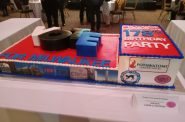 Jan 27th, 2024 by Michael Horne
Jan 27th, 2024 by Michael Horne
-
Will There Be a City Attorney Race?
 Nov 21st, 2023 by Michael Horne
Nov 21st, 2023 by Michael Horne


